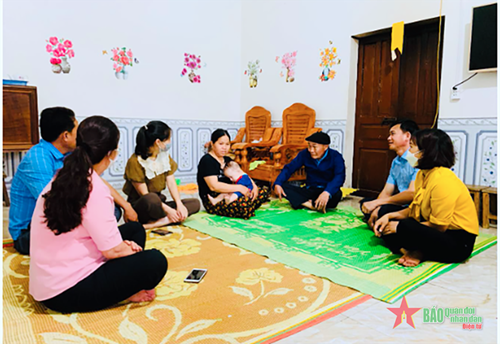War veteran Giang Mi Pao was born in 1944. He served in the military for six years and was admitted to the Party. After completing military service, the former soldier came back to his hometown and was appointed the village’s head.
    |
 |
|
Mr. Giang Mi Pao (third from the left) and cadres of Viet Lam townlet, mobilizing locals to build cultural life |
Mr. Pao recalled that in early 1980s, people in the locality faced numerous difficulties since they lacked cultivation land, proper production tools, seedlings, capital, and farming techniques. The whole hamlet had only 2 hectares of land for one-crop rice growing and locals used to suffer from hunger for 4 to 6 months/year.
As the only party member in the hamlet at that time and a former soldier who had joined the national resistance war, Mr. Pao kept thinking about locals’ difficulties and how to develop local economy, eliminate hunger, and reduce poverty sustainably. After days and nights studying other localities’ economic development models, the war veteran discussed and worked with ten brothers and sisters to start transforming plant and livestock structures, reclaiming land for cultivation, and growing more crops, and planting more fruit trees.
A few years later, the living standards of Pao’s family and his relatives clearly improved. The war veteran’s effective model inspired locals in Suoi Dong hamlet to stick to the land and continue the production. Since then, a poverty elimination movement has been kicked off in the whole hamlet. The VAC economic model (VAC in Vietnamese is vuon, ao, chuong, which means garden, pond, livestock pen) of Mr. Pao’s family brought an average income of more than 40 million VND per year.
The improvement of his family’s living standards was not enough for the war veteran, who then came up with methods to help other people enhance theirs. He borrowed hundreds of millions of VND from the bank to both serve his family’s economic development activities and lend the capital to locals to develop their production. He also built a credit fund and mobilized locals to send their savings to the fund to assist needy households in farming. In late 1980s, Mr. Pao encouraged local residents to build a 1.5-kilometer road and asked the district’s authorities to support the construction of a suspension bridge over a large stream connecting Suoi Dong hamlet and others.
Thanks to the effort, the living standards of local people have been significantly improved. Meeting halls, electric system, roads, and schools have been built to meet the needs of people in the hamlet. From just one party member, the village now has a party cell. The results have come from the efforts of party member, war veteran Giang Mi Pao.
Translated by Tran Hoai